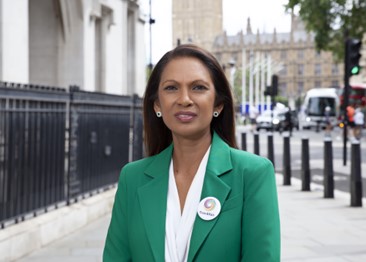
If the answer is David Cameron, what on earth was the question?
Cameron’s back in government, despite not being an elected MP – and despite austerity, Greensill and Brexit, writes Bremain Chair Sue Wilson MBE for Yorkshire Bylines.
Just a few short (or tediously long) weeks ago, Prime Minister Rishi Sunak declared himself to be the man to “fundamentally change our country”. At the recent Conservative Party conference, Sunak aimed to convince his audience that he was the “change candidate” – the one to breathe new life into a very poorly party, and a very poorly country. Those claims now look increasingly ridiculous following his latest reshuffle, and the return of David Cameron to frontline politics.
“How can you argue that you're bringing back somebody like David Cameron when you're also trying to be the man of change?”
Rishi Sunak has appointed the former Prime Minister as Foreign Secretary. @NatashaC is outside Number 10. pic.twitter.com/XrOH1NkgVw
— LBC (@LBC) November 13, 2023
Cameron’s back
Following the sacking of Home Secretary Suella Braverman (finally, and not for the first time) on Monday morning, James Cleverly was shuffled from the Foreign Office to the Home Office. His appointment as Home Secretary comes just 48 hours ahead of a Supreme Court decision on Wednesday regarding the government’s Rwanda deportation plans.
In his place, former PM David Cameron has been appointed foreign secretary, despite him not being a serving MP. In order to be able to take up a place in Cabinet, Cameron – who resigned as PM over Brexit following the 2016 referendum – has also received a life peerage.
It would seem that Sunak is willing to overlook Cameron’s previous poor judgement over Brexit, austerity and a lobbying Scandal involving Greensill and the pocketing of $10mn dollars. Perhaps, after everything that Braverman has put Sunak through while in office, Cameron looks a cosy companion by comparison.
Rishi Sunak can’t find a single Conservative MP good enough to fill the Foreign Secretary role, and has to resort to bringing back David Cameron, who left our country in a mess and who is still under suspicion for a lobbying scandal. https://t.co/4P7DHOXSws
— Tim Farron (@timfarron) November 13, 2023
Spoilt for choice, not!
When the answer to any question is David Cameron, then you know the country is in deep trouble. Bringing back the man largely responsible for the beginning – if not the end – of the destruction of the Tory party, is bad enough. Let alone the damage done to the country. Not that this would be of any concern to Sunak, who seems intent on doing all he can to make matters even worse.
What the decision does spell out clearly – to those in Westminster and in the country at large – is the complete lack of talent there is to choose from, either on the front or back benches.
Beth Rigby, "One former Cabinet Minister messaged me saying.. Cameron is superb, but also it's a message to the House of Commons that we don't have any MPs that the Prime Minister felt was good enough to be his Home or Foreign Secretary" pic.twitter.com/9oVyXnvrmg
— Farrukh (@implausibleblog) November 13, 2023
According to Sky News political editor Beth Rigby, a former Cabinet minister said Cameron’s return was “a message to the House of Commons that we don’t have any MPs that the prime minister felt was good enough”. And these are the people making life-changing decisions and supposedly running our country.
Leader of the True and Fair Party, Gina Miller, said of Cameron’s appointment that it exposed “the vacuum of accountability at the heart of government”. Miller also pointed out that Cameron would “not even be able to answer questions in the House of Commons”. She called on Sunak to reset the rules to allow ministers from the House of Lords to be questioned in the Commons.
Green MP Caroline Lucas questioned whether we can now expect major foreign policy statements to be made in the unelected Lords, describing the prospect as an “unacceptable degrading of [a] key office of state”. She added, “appointing the reckless Brexit referendum instigator” as foreign secretary was a “democratic embarrassment”
Sense of entitlement
If Sunak believes Cameron to be the best person for the job, then he is seriously misjudging both the role of foreign secretary and the extent of Cameron’s talents. But then he’d be in good company with Cameron himself. According to LBC’s James O’Brien, author of How they broke Britain, Cameron not only “thinks he’s a genius” but thinks he’s “possessed of some unique set of skills”. His tenure at number 10, and his handling of Conservative Party divisions – Brexit in particular – would seem to prove otherwise.
Sharing his good fortune on X, formerly known as Twitter, Cameron identified a “daunting set of international challenges” that the country faces, “at this time of global change”. He said that while he “may have disagreed with some individual decisions” made by the PM, Sunak was a “strong and capable Prime Minister”. Clearly Cameron’s judgement has not improved any over his seven-year semi-retirement. Nor his sense of entitlement.
Cameron may not be expecting a full-blooded welcome back, but I wouldn’t put it past him. Whether the country has forgiven or forgotten his misdeeds – gambling away our futures for the sake of his party, ruining our trading relationship with our European neighbours, or walking away from the mess he created – remains to be seen.
One saving grace is that, if all goes as expected, Cameron’s role will be short-lived. His likely replacement, shadow foreign secretary, David Lammy, put it best. Cameron “was a disastrous PM” and this is “a last gasp act of desperation from a government devoid of talent and ideas”.
What a shame we won’t get to see Cameron vs Lammy at the despatch boxes. But let’s be grateful for small mercies. Not seeing Cameron back in the Commons is definitely preferable to the alternative.












